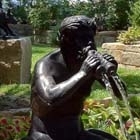Visit my wonderful garden in the Palazzo Dei Cani Neri in Austin and see the beautiful bronze statues and fountains there!

Chapter XLII
How Vladimir died
On reaching Imatra at half-past six in the afternoon we found :Mme, Kharina at the station. I had seen her only once in July, 1919, at Mlle. Ponomareff's, at a lecture given by Koni. Handsome, clever, sympathetic, well-informed, she had quickly found her way into the hearts of my young daughters, She embraced me as though we had known each other a long time. We got into a sledge, while young Wielandt followed us with my bag. During the hour's drive she spoke of nothing but the girls. I noted her effort to distract me, but I had only the one idea in my mind - how to tell them the dreadful truth! I was so absorbed by this anguishing thought that I did not notice the beautiful cataract of Imatra which tourists come from all parts of the world to admire!
On reaching the Ranha sanatorium, I was received by Dr. Gabrilovitch, who told me that my daughters had not been warned that I was commg,
" I shall be there," he said to me, "and if the shock is too violent, I have everything at hand that can be required, such as valerian, ether, etc."
I went down a long corridor, accompanied by the doctor and Mme. Kharina, then we went upstairs to the first floor and stopped in front of a door.
"This is the room," said the doctor in a low voice.
I was conscious of the quickened beating of my heart. I took off my hat with the long crepe veil so as not to frighten them, and I opened the door quickly. In the room beyond I saw my two dear little ones to whom I was to deal so terrible a blow. I would have given my life to spare them. On hearing me enter they raised their heads and threw themselves on my neck with cries of joy:
"Mamma, darling mamma! " Then, after a moment or two, Irene asked:
"And papa, where is papa? Why is he not here? "
Trembling from head to foot against the door, I replied;
"Papa is ill, very ill,"
Nathalie burst into tears. Irene, livid, and white to the lips, her eyes like burning coals, cried out:
"Papa is "'dead!"
"Papa is dead," I repeated in low tones, \vhile the two fell forward into my arms.
I spent a terrible fortnight with my poor children. I had not the courage to tell them that their father, so good, so generous, so loyal, so noble-hearted, had perished as the victim of infamous assassins. I told them that he had died of illness, without agony, without pain.
Every day Dr. Gabrilovitch observed that my own malady was becoming worse. He insisted on my being taken to Viborg to an immense medical establishment which Professor Granburg had erected there, half at his own expense, half at the expense of the State. There was one building there for operations, one for convalescents, one for mental cases, one for children, etc. Professor Granburg kept me there three weeks, and was lavish of touching attentions to me and treated me with the greatest skill. My health improved gradually and thoughts of Vladimir and my young daughters began to fill my heart. I said to myself that, my husband being no more, I would try to live for my three children. With a son like Vladimir, life might still be bearable. In spite of ugly rumours that had been current regarding the prisoners of Alepaevsk, I continued to hope, all the more that new and different reports had come to contradict the other ones, A letter from Stockholm from my son Alexander, in which he expressed fears as to Vladimir, troubled us profoundly. Could we believe, however, that after such a grief as ours, a new grief, equally terrible, was going to fall upon us? After my return to Ranha on March 25th, 1919, the Feast of the Annunciation, I received a letter from the Grand Duchess Constantine, whose three sons, Prince John, Prince Constantine and Prince Igor, had perished at Alapaevsk, a letter, the kindness and tenderness and courage of which did not serve to soften the terrible blow it dealt me. She sent me a copy of a letter from General Knox, who had got to Alepaevsk with the English and Tcheko~Slovak troops, and who had written as follows to someone attached to the Court of the King of England:
"The prisoners were taken from Viatka to Ekaterinberg. They could easily have escaped from Viatka, for they enjoyed a certain freedom there, but they considered themselves bound by an undertaking which they had given. From Ekaterinburg they wefe taken to Alapaevsk, which was the centre of Bolshevism. They arrived at the school late at night. The house was unclean and without beds. They slept on benches and next day dirty beds wefe brought from the hospital of the district. The princes cJeaned everything themselves and scraped the floor. During the night of July 4th/17th they were given their dinner at six o'clock and told that they were going to be taken in a direction unknown and they were ordered to leave all their baggage in the school. They were made to get into troikas and were taken a distance of twelve kilometres from the spot into a forest. They were now aware of the fate awaiting them and they sang hymns while they were being driven in the direction of the coal pits. The Grand Duchess Elizabeth Feodorovna was thrown down into them first, alive. The Grand Duke Serge Michailovitch attempted to struggle and was killed by a bullet through the head. All the others were hurled down alive and after each victim stones and logs of wood were thrown down. Then a great quantity of dynamite was thrown down but it did not explode, and this made it possible to find the bodies. I have seen photographs of the corpses and I fear that no doubt is possible. The windows of the school were broken to make people believe there had been an attempt to escape. I am glad to add that when the troops of the Government arrived they shot eighty of these miscreants,"
Until I read this letter I still had hope. Everything went now. I felt the divine Cross fall upon my shoulders with all its weight and I realised that nothing remained for me but duty: the duty of living on for my two daughters until the day when they should have no need of me any longer; the duty of living on in order to make the world aware of the beauty of the souls of the Grand Duke Paul and of my son; the duty of revealing to mankind - led astray and unheeding - the hideousness of the Bolshevist danger. Half my task is completed. May God have pity on me and not prolong my torment on earth! May the Lord permit my tortured soul to discard the mortal covering which burdens it, and may He allow it to take wings towards THEM whom it so loved here below!





